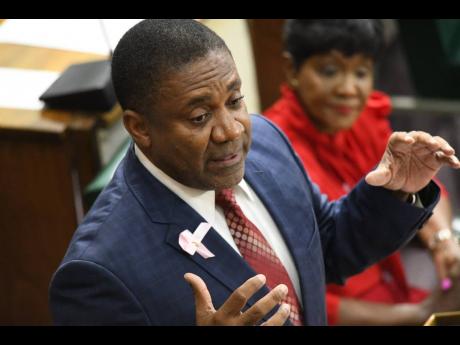Editorial | Follow Mr Paulwell
Phillip Paulwell’s announcement this week of his intention to repeat his action of seven years ago and release his assets and liabilities filings since 2017 is a positive development that will hopefully encourage similar transparency by other members of parliament. For whatever may be Mr Paulwell’s motive, following him might help to bolster confidence in a group of people and an institution in which Jamaicans have little trust.
Indeed, Mr Paulwell’s decision reminds that this level of openness was initially proposed as a legal obligation for all parliamentarians that had the support of Prime Minister Andrew Holness, and that a parliamentary committee which has been reviewing the Integrity Commission Act is yet to report on its work.
It would be useful for the committee’s chairman, the justice minister, Delroy Chuck, to provide a status report on its efforts, including whether the specific question of whose integrity filings are made public is, or was, under consideration. If that issue hasn’t been, and wasn’t intended to be, considered, then this newspaper suggests that it is urgently placed on the agenda – even if that requires reopening hearings and extending the life of the committee.
Launched in 2018, the Integrity Commission (IC), which subsumed three existing good-conduct bodies, is Jamaica’s primary anti-corruption agency for public officials. Annually, all legislators, public servants who earn J$12 million and above, as well as some other specified State employees, must lodge income, assets and liabilities reports with the commission. The IC, using a mix of random and risk profile analyses, seeks to determine whether the wealth of politicians and public officials are in sync with their verifiable incomes.
Under the law, summaries of the certified filings of the prime minister and the leader of the opposition are published, but not those of other legislators or public officials. Although, for at least two cycles those for Mr Holness (and his filing for a third would recently have been due) have not been released, apparently because the commission has not signed off on them.
LAW PREVENTS
The IC says the law prevents it from disclosing the reason for this delay, unless it has sent a report on the matter to Parliament.
Mr Holness himself has said that he has responded to the commission’s request for additional information, but hasn’t given details.
Seven years ago, apparently responding to speculation about his own wealth, Mr Paulwell, a former minister who is now leader of opposition business in the House, posted on his Facebook page his annual filings with the Parliamentary Integrity Commission – one of the agencies subsumed by the IC – for the 22 years since he entered Parliament in 1995.
On Tuesday, Mr Paulwell reminded that in 2017 he had called for both the leader of government and opposition business in Parliament to be made to join the prime minister and the opposition leader in having their filings “subject to public scrutiny”. He acted unilaterally in the absence of this legal obligation.
“I intend to repeat that disclosure,” he said.
One other MP, the shadow finance minister, Julian Robinson, has in the past – in 2016 – voluntarily released his complete statutory declarations for several when questions were raised about his ability to afford a home being purchased by he and his wife, who, at the time, was the head of a local bank.
Around the same time, months into his premiership and ahead of the passage of the Integrity Commission Act, Mr Holness allowed journalists to inspect at his office his own filings, from 2007 up that period.
BROADER TRANSPARENCY
During the 2017 debate of the Integrity Commission Act, Mr Holness said that while the law would limit public disclosure of assets to himself and the opposition leader, he was in favour of a broader transparency.
He said: “I believe that this disclosure should extend to all parliamentarians and also other public officials; but I am satisfied by the inclusion … which provides that in within two years, a decision will be made as to all other persons who will be required to disclose their assets and liabilities, and as to the form of that disclosure.”
The prime minister’s reference was apparently to section 60 of the Act, which calls for the law to be “reviewed from time to time”, as was being done by Mr Chuck’s committee.
Unfortunately, the posture of the Government members in those discussions and elsewhere were largely hostile to the IC. There were proposals to reduce transparency and bring the commission directly under the thumbs of politicians.
While the anti-IC rhetoric, including claims of bias against governing Jamaica Labour Party members, has cooled in recent times, there is no certainty of its death.
However, now that Mr Paulwell has resurrected the question of whose statutory declarations should be made public, Mr Holness should disclose his current position on universal transparency. Hopefully, he is of the same view .
At the very least, he should insist that all members of the Cabinet be subject to the disclosure regime that applies to himself and the opposition leader, Mark Golding.
Additionally, if the law doesn’t change at this time, Mr Golding should pledge full transparency within three months should his party assume government.

